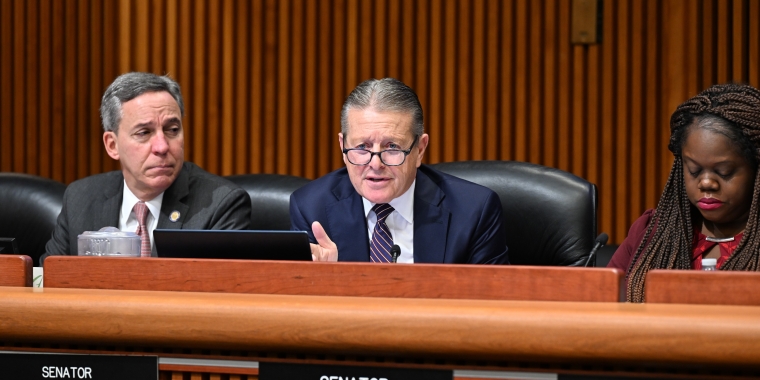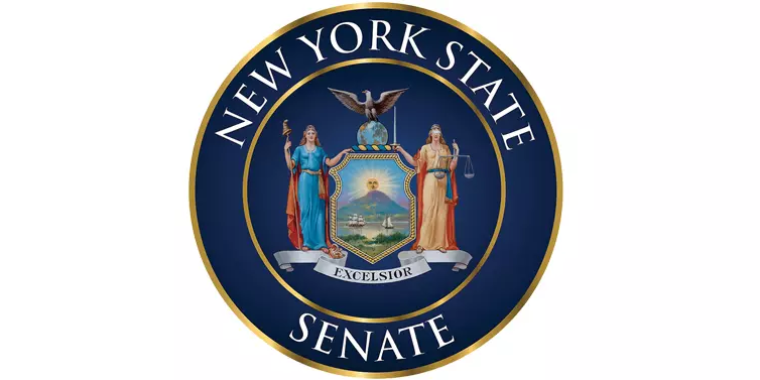
Senator Gallivan Joins Colleagues in Unveiling Sweeping Tax Cut Plan
Jim Ranney
March 10, 2016

Senator Patrick M. Gallivan, (R-C-I, Elma) and members of the New York State Senate Republican Majority today unveiled the first part of their one-house budget proposal that creates a broad-based tax cut plan to provide billions of dollars in tax relief to the middle class, seniors, and small businesses. The plan creates a new 25 percent rate reduction for middle class taxpayers, new tax savings to prevent seniors from leaving New York, and significant tax cuts for small businesses, farms, and other job creators.
“High taxes hurt our families and discourage economic development,” Gallivan said. “By providing meaningful tax relief, we can improve the quality of life for hardworking New York families and seniors. These cuts will also encourage small businesses to grow and create jobs, making New York a better place to live, work and raise a family.”
The highlight of the Senate Republicans’ tax plan is the new Middle Class Income Tax Relief Program that establishes the lowest middle class tax rate in more than 70 years. Starting in 2018, a total of 5 million eligible taxpayers – including more than 770,000 small businesses who file under the Personal Income Tax – would begin seeing savings. When fully implemented in 2025, middle class New Yorkers will pay a 25 percent lower tax rate and save $3.5 billion in taxes each year.
Right now, existing middle class tax cuts are set to expire in 2018 and the tax rate will jump to 6.85 percent. This results in an annual cost of $155 on average to middle class taxpayers, totaling $700 million per year. The Senate’s plan not only eliminates this expected middle class tax increase, but it also phases in a 25 percent tax rate reduction to 5.14 percent when fully effective. This permanent rate cut saves middle class taxpayers an average of $897, for a total of $3.5 billion per year in 2025 and thereafter.
Taxpayers eligible for the savings include: single filers with taxable income between $20,000 and $150,000; heads of households with taxable income between $30,000 and $225,000; and married joint filers with taxable income between $40,000 and $300,000. The proposal prevents the existing middle class tax cuts from expiring in 2018 and then begins a rate reduction in 2019 that will be phased down each year over seven years. It would also continue the current indexing of income bracket on a permanent basis.
The Senate Republicans’ budget proposal also includes new income tax relief to help more seniors save money and choose to stay in New York during retirement. The tax cut would provide the first increase to the exempt amount of private pensions and retirement income since 1981, saving approximately $275 million annually when fully phased in.
For 35 years, seniors have been able to claim the first $20,000 of pension or retirement income as exempt income. The Senate Majority’s proposal increases that exempt amount to $27,000 in 2017, $34,000 in 2018, and $40,000 in 2019. This would provide tax relief to more than 377,000 seniors and, in the first year alone, would save each an average of $361.
The Senate’s plan will also expand small business tax cuts that were enacted in 2013 to provide even more tax relief to help entrepreneurs grow and create jobs. The Senate successfully advocated for the inclusion of a Personal Income Tax (PIT) exemption for small businesses and small farms in the 2013 budget. This year eligibility to receive the tax savings would be significantly expanded. Once fully enacted, the cuts would save small businesses and small farms $494 million annually.
The proposal expands the eligibility of a small business to include any business that files under PIT regardless of how the business is structured; raises the income eligibility threshold from $250,000 to $500,000 when the business entity income is less than $1.5 million; eliminates the employee requirement; increases the exemption from 5 percent to 15 percent for small business income and from 5 percent to 20 percent for farm income; increases the Corporate tax threshold from $390,000 to $500,000; and reduces the Corporate business income rate for small businesses from 6.5 percent to 2.5 percent over two years.
The Senate Republicans’ plan will also:
- Fully eliminating the 18-a Utility Tax Surcharge: In 2009, the utility tax surcharge cost ratepayers nearly $600 million annually. In 2013, the Senate successfully fought for a phase-out of the assessment, saving ratepayers $455 million over the five-year phase-out period. In 2014, the Enacted Budget contained an additional $600 million in savings over the remaining phase-out, which is scheduled to be completed by the end of 2017. The Senate’s budget proposal would permanently eliminate the 18-a surcharge by the end of 2016 and save taxpayers $125 million.
- Save on estate taxes to help future generations of business owners: To encourage small businesses and farms to pass down their business from one generation to the next, the Senate is proposing to speed up the full phase-in of estate tax reform first enacted in 2014. This will allow estates to have a tax exclusion amount equal to the federal exclusion amount when the estate has farm operations or small business property and where the value of the farm operations or small business are a majority of the estate. Starting April 1, 2016, the exclusion would be increased to $5.45 million, resulting in an annual savings of $70 million and a $210 million cumulative savings by 2020.
-30-
Share this Article or Press Release
Newsroom
Go to Newsroom


